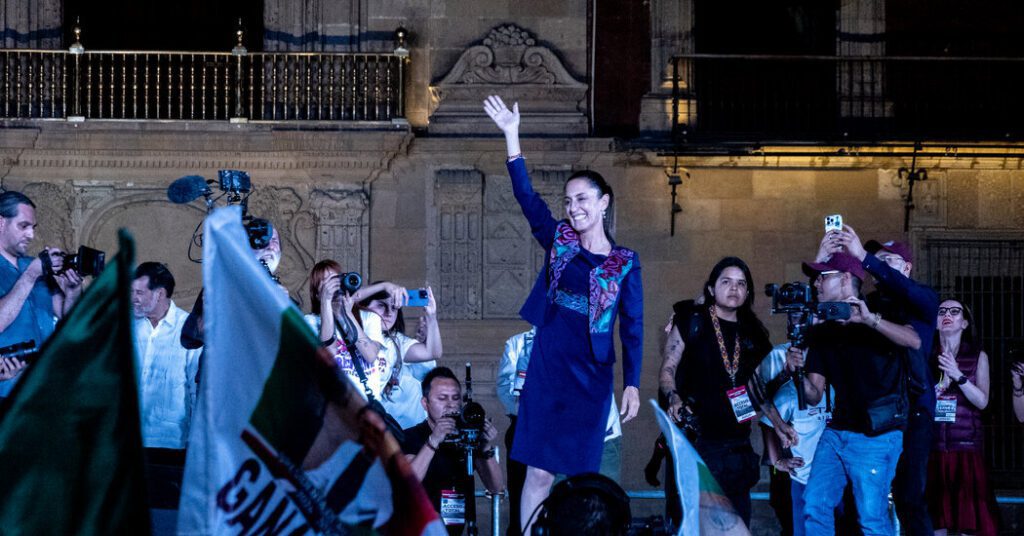Claudia Scheinbaum won Mexico's largest presidential margin in decades, and as vote counting continued on Monday it became clear that Mexico's leftist ruling party and its allies are positioned to transform the country's political landscape.
They appear intent on winning a large enough majority in parliament to pass constitutional changes that have alarmed the opposition, including pushing ahead with controversial legislation that could dismantle a key check on presidential power.
Scheinbaum, the first woman and first Jew elected president, beat her opponent by more than 30 percentage points in Sunday's vote, according to early tallies. The landslide victory for Scheinbaum and her Morena party surpassed pre-election polls that predicted they would win.
“We are going to give it our all in these elections,” Morena party leader Mario Delgado said in a speech on Sunday.
The election served as a referendum on current President Andrés Manuel López Obrador's nearly six-year term in office, reflecting the support of a majority of voters for his governance of the country.
Preliminary results show Morena is on track to win seven of the nine state gubernatorial posts up for grabs – including the most powerful one in Mexico City – and to win majorities in at least 22 of the 32 state legislatures.
During Lopez Obrador's presidency, millions of people were lifted out of poverty, the minimum wage doubled and pensions became more accessible to more Mexicans, but he also empowered the military, prioritized fossil fuels and pushed through measures that critics say could weaken Mexico's democratic institutions.
Still, concerns about those moves have done little to sway most voters who support Lopez Obrador's successor, Sheinbaum, and his party.
“Voters gave Claudia a mandate that very few could have predicted,” John Feeley said. He served as charge d'affaires at the U.S. Embassy in Mexico from 2009 to 2012. “Claudia cleaned up the house.”
But some critics are already alarmed by the rise of the Morena party, which has greater control in both houses of Congress.
“We had ruled out the possibility that Morena had a blank check to do anything, and yet that's what's happening now,” said Roberta Rajo, a diplomat who served as Mexico's ambassador to four countries. “Democratic institutions have been used to limit democracy.”
Lopez Obrador's proposed reforms include reducing the number of members of Congress, eliminating many independent regulatory agencies and transferring their functions to federal agencies, and requiring Supreme Court justices to be elected by popular vote. He also seeks to have election officials elected by popular vote, a move critics have warned would weaken their independence.
Opposition in parliament has so far thwarted that ambition.
“The majority of the population seems to agree: Go ahead with the project,” said Sergio Lopez Ayron, a law professor at Mexico's National Autonomous University who has advised institutions including the Mexican Senate and Supreme Court.
But Morena and the two smaller parties in the Electoral Coalition are still missing one piece of the puzzle to fully exercise their legislative powers. Early results show the coalition has a two-thirds supermajority in the lower house to push through constitutional reforms, but it may be a few seats short in the upper house. Even then, legal experts say it could still secure a supermajority by negotiating with other lawmakers.
“They're going to have to do some negotiations,” Lopez Ayron said, adding that if they win the seats they need in the Senate, “that would pave the way for a very quick constitutional amendment.”
It's unclear how eager Scheinbaum, who takes office on Oct. 1, is to actually push through the reforms that Lopez Obrador introduced in February and quickly adopted as his own. Though she has publicly defended the proposals, analysts also note that she had no choice but to fully support Lopez Obrador during the election campaign.
Election officials are expected to announce the final results of the election this week.
The Mexican peso fell more than 3 percent on Monday, a rare drop for a currency that has been strong recently against the dollar. Financial strategists say the financial market turmoil reflects broader fears about a potential erosion of checks and balances that could lead to an expanded role for the government in the economy.
Roberta Jacobson, a former U.S. ambassador to Mexico, said a big concern for businesses was the possibility of “electing justices all the way to the Supreme Court and effectively eviscerating the independence of regulators.”
Critics say elections of judges could expose them to political pressure, make them beholden to political leaders and hesitant to rule against their political patrons. Jacobson said the move could affect companies' ability to get a fair hearing for disputes with regulators and the judiciary.
“What you're doing is keeping these agencies in place but removing any pretense of independence by handing their functions over to the executive branch,” she said of the regulators. “So you remove that pretense of independence and give that power to the president.”
“We respect business freedom and will conscientiously encourage and facilitate private investment, both domestic and foreign,” Scheinbaum said in a speech to supporters on Monday morning, signaling his openness to working with the private sector.
Jacobson said it's possible she will make these measures a priority “given their importance to Lopez Obrador's project and legacy,” but she added that “the other possibility is that she will leave it without urging a vote.”
Yet another scenario has worried the government's opponents: If the new Congress were to convene in September and temporarily overlap with the final month of Lopez Obrador's term, giving the president a chance to push through structural reforms if his party secures a majority in the Senate.

